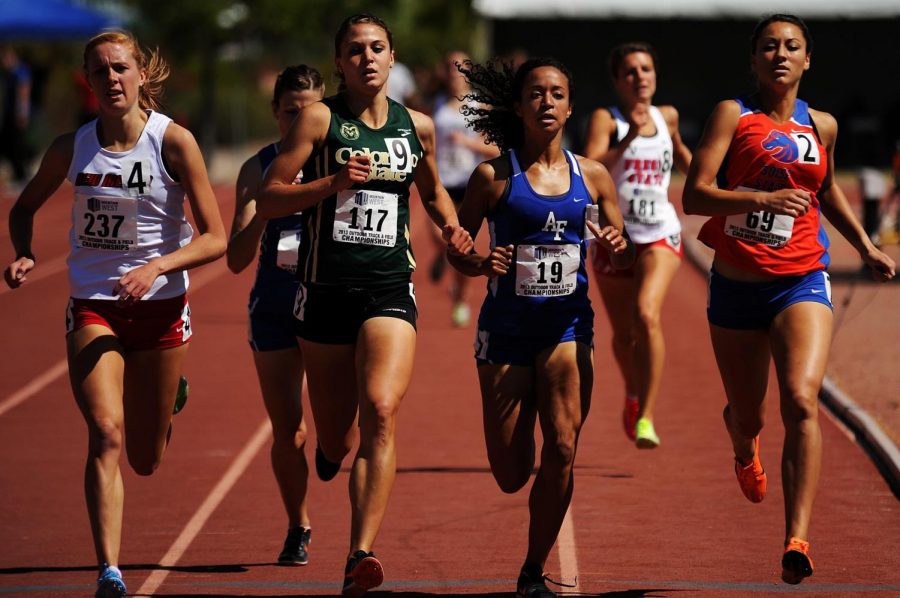Op-ed: Mary Cain fights female abuse in sports with the help of young consumers
December 4, 2019
In an opinion piece for the New York Times, professional distance runner Mary Cain accused her former coach, Alberto Salazar, and the Nike Oregon Project of subjecting her to emotional and physical abuse. These allegations led to an outcry against Nike for perpetuating a system that damages women’s health in a win-at-all-costs mindset. Body-shaming female athletes is a prominent, universal issue, and Cain’s testimony brings it to light. With the rise of social media’s influence on the financial success of companies like Nike, Generation Z and millennial consumers have the power to demand systemic change for women’s health in sports.
Cain described how Salazar’s regime centered around weight reduction as a means to success; she was forced to lose dangerous amounts of weight, eventually suffering from Relative Energy Deficiency in Sport, or RED-S, Syndrome. As a result of her training at the Nike Oregon Project under Salazar, she became at risk for osteoporosis and even infertility, losing her period for several years and breaking five bones. She also struggled with self-harm and suicidal thoughts. Her testimony is paramount in drawing out issues of body shaming in professional running. Persuasive and personal, Cain speaks to the difficulty of going public with her experiences and the ways the sports training system needs to be altered to prevent the abuse of female athletes.
In the wake of Cain’s allegations and separate doping investigations, Salazar has been banned for four years, and the Nike Oregon Project has been shut down. Although these repercussions seem to be a positive step for women’s health in sports, Salazar’s dismissal stemmed mostly from the doping scandal, not his harmful training, and will not lead to desired systemic change. As Cain states, “you can’t just fire a coach and eliminate a program and pretend the problem is solved.” She’s right. However, the abusive sports system is facing pushback for its wrongs in another way: financial losses. Society holds large corporations like Nike accountable for their actions as Gen Z and millennial consumers have powerful sway in their economic success. Desperate for lifelong brand loyalty, Nike’s priority target market is young consumers. Increasing their selection of culturally relevant brands and products with strong moral standings, GenZ and millennials are conscious buyers. As a result of the allegations, Nike is expected to be affected financially by a decrease in sales. Although Cain’s statement that Nike’s actions only provide surface-level solutions rings true, political consumers have the power to initiate necessary consequences for an abusive system.
After the release of her statements, Cain received an outpouring of support from fellow professional runners via Twitter. There was reinforcement of the truth of her circumstances and similar stories of mistreatment and abuse at the hands of Nike and the Oregon Project. The social media blow-up is absorbed by young, conscious consumers. Covering the economics of sports for Forbes magazine, Patrick Rische predicted that Cain’s allegations will drop Nike’s stock price to “between $77-80 per share by the end of 2019.” According to Rische, Nike won’t lose its position as the market leader, but it will suffer reduced sales among a younger generation of women who care about the morality of the companies they endorse.
This type of consumption protest stems from larger events such as the Montgomery bus boycott in the U.S., the global boycott of South Africa during apartheid, or, more recently, the Chick-fil-A anti-homophobia boycott. Climate change is an emerging focus of ethical consumption, as buyers boycott tuna, paper, fast-food chains, and even large corporations like Nike for their overuse of natural resources. Empowering the average consumer to represent their beliefs through purchase has been around for decades and remains an important political weapon. In the case against Nike, those who choose to boycott the company’s products are activists in their own right, rejecting a corrupt, body-shaming system of women’s athletics.
Although Nike is the focus of much of the female sports abuse allegations, the problem is larger than them. As former Oregon Project athlete, Kara Goucher, said, “this is a broader problem of the way we treat women athletes as objects instead of humans.” ESPN reports that, in a survey of 200 plus Division 1 athletes, 68 percent say they feel pressure to be pretty, and 15 percent say they’ve had an eating disorder, though this number is likely underreported. Body shaming in athletics is a prevalent universal issue. Nike, as a market superpower, has a chance to right their mistakes and lead an overthrow of systemic female abuse in athletics.
Discussing body image in women’s sports, a Guardian article states that “sport – in it’s truest form – is as much about women taking back control of their own bodies as any other feminist act.” Cain’s testimony fights for this sentiment in female athletics and against the abusive system she suffered. She is supported by young consumers and their power to create consequences for large corporations, making this ethical purchasing also a feminist act.
Marie Senescall is a first-year biology and English combined major.







